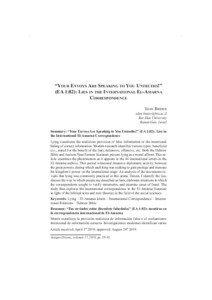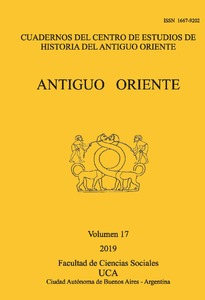Please use this identifier to cite or link to this item:
https://repositorio.uca.edu.ar/handle/123456789/10310| Título: | “Your envoys are speaking to you untruths!” (ea 1:82) : lies in the international El-Amarna correspondence “Tus enviados están diciéndote falsedades” (EA 1:82) : mentiras en la correspondencia internacional de El-Amarna |
Autor: | Breier, Idan | Palabras clave: | HISTORIA DE EGIPTO; EGIPTOLOGIA; HISTORIA ANTIGUA; CIVILIZACIONES ANTIGUAS; CORRESPONDENCIA; MENTIRA; HISTORIA POLITICA; RELACIONES INTERNACIONALES | Fecha de publicación: | 2019 | Editorial: | Universidad Católica Argentina. Facultad de Ciencias Sociales. Departamento de Historia. Centro de Estudios de Historia del Antiguo Oriente | Cita: | Breier, I. “Your envoys are speaking to you untruths!” (ea 1:82) : lies in the international El-Amarna correspondence. [en línea], Antiguo Oriente : Cuadernos del Centro de Estudios de Historia del Antiguo Oriente. 2019, 17. Disponible en: https://repositorio.uca.edu.ar/handle/123456789/10310 | Resumen: | Abstract: Lying constitutes the malicious provision of false information or the intentional
hiding of correct information. Modern research identifies various types: beneficial
(i.e., stated for the benefit of the liar), defensive, offensive, etc. Both the Hebrew
Bible and Ancient Near Eastern literature present lying as a moral affront. This article
examines the phenomenon as it appears in the 44 international letters in the
El-Amarna archive. This period witnessed intensive diplomatic activity between
the great powers, during which each king was seeking to gain prestige and increase
his kingdom’s power on the international stage. An analysis of the documents reveals
that lying was commonly practiced in this arena. Resumen: Mentir constituye la provisión maliciosa de información falsa o el ocultamiento intencional de información correcta. Investigaciones modernas identifican varios tipos: beneficiosa (es decir, que trae un beneficio para quién miente), defensiva, ofensiva, etc. Tanto la Biblia hebrea como la literatura del Cercano Oriente Antiguo presentan la mentira como una afrenta moral. Este artículo examina el fenómeno tal como aparece en las 44 cartas internacionales del archivo de El-Amarna. Este período atestiguó una intensa actividad diplomática entre los grandes poderes, durante el cual cada rey buscaba ganar prestigio e incrementar el poder de su reinado en la escena internacional. Un análisis de estos documentos revela que la mentira era una práctica común en este contexto. |
URI: | https://repositorio.uca.edu.ar/handle/123456789/10310 | ISSN: | 1667-9202 | Disciplina: | HISTORIA | Derechos: | Acceso abierto | Fuente: | Antiguo Oriente: Cuadernos del Centro de Estudios de Historia del Antiguo Oriente 17, (2019) |
| Appears in Collections: | AO - 2019 vol. 17 |
Files in This Item:
| File | Description | Size | Format | |
|---|---|---|---|---|
| your-envoys-are-speaking.pdf | 149 kB | Adobe PDF |  View/Open | |
| cover.jpg | 121,62 kB | JPEG |  View/Open |
Page view(s)
264
checked on Apr 30, 2024
Download(s)
324
checked on Apr 30, 2024
Google ScholarTM
Check
This item is licensed under a Creative Commons License

